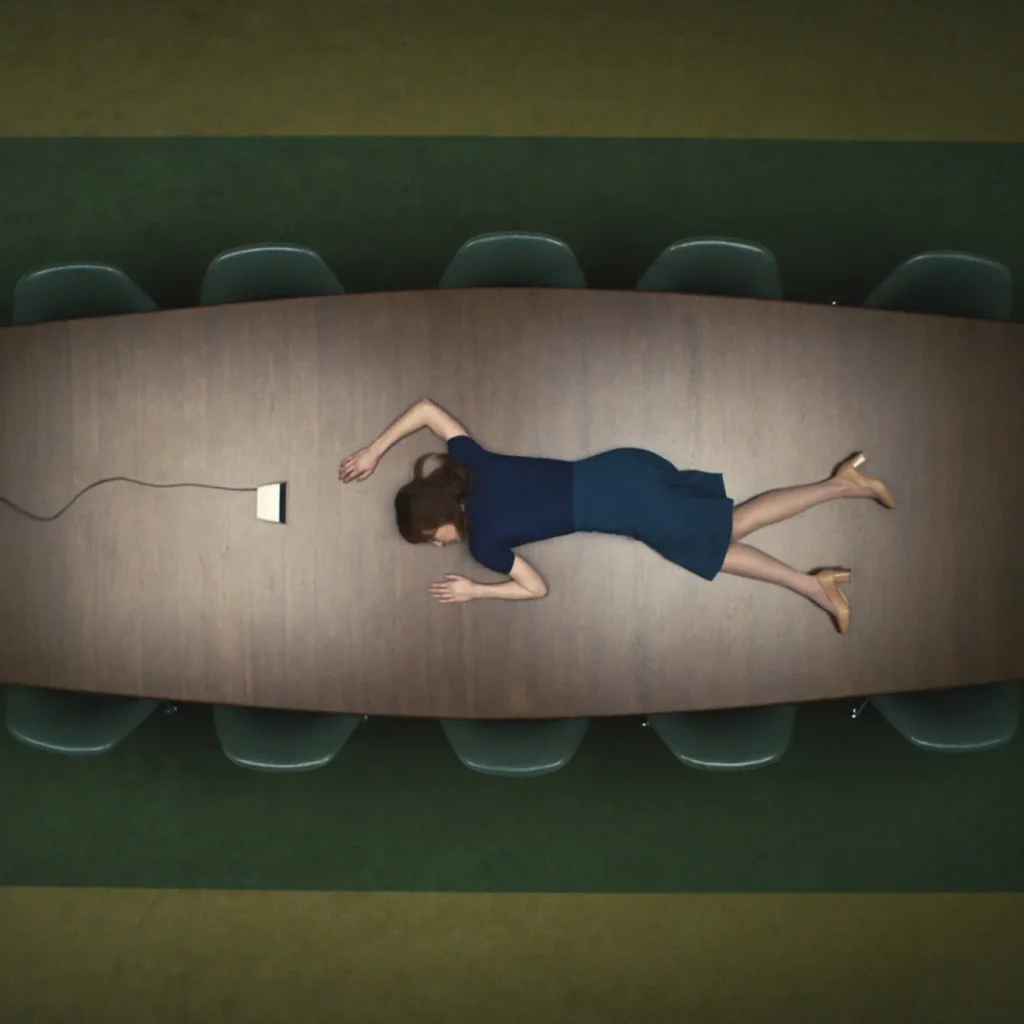”Good News About Hell” S1/E1

”When we are born, we cry that we are come to this great stage of fools.” — William Shakespeare, King Lear, Act IV, Scene 6
We are thrown into this world as babies, screaming our lungs out. Yet we are blessed to enter to the loving arms of our mother, in the care of people who’ve studied for years to protect us from harm. It’s strange and terrifying but eventually, we find comfort in the chaos.
Helly R. was born on a boardroom table, to a voice asking “who are you?” from a small speaker. She is tastefully dressed in the color palate of her environment, a sweater and skirt in shades of blue, on top of the same fake laminated mahogany table you see in every company, amid a structure of green/blue chairs and carpet. Her scarlet hair blends with the table; her pale limbs with the tan shoes.
She squints with confusion at the box and inquires “hello?” She reaches to the back of her neck, as if feeling the procedure that led her to this spot. Does she have a real memory of the severance or is it the body remembering what the mind cannot? The voice then backtracks “I’m sorry, I got ahead of myself.” The voice then says cheerfully “Hi there, you on the table, I wonder if you’d mind taking a brief survey.” Helly has the kind of expression all of us portray when approached with this question midway through a painful customer service encounter that is not yet over.
She starts to rebel. She asks back, in defiance of the script, who is speaking, and even though she’s clearly still groggy from the brain surgery, she’s able to work her way to the door and try the locked handle. She tells the voice that she’s not taking the survey and looks for an open door. The scene is taking on the feel of an escape room adventure. She circles the room back to the door and demands to be let out.
Helly falls to the ground in exhaustion. Then she peaks her head up, looking at the speaker. She appears like a whack-a-mole amid the chairs on the same visual plane. Seeing no other way out, she contemplates some cooperation and asks “five questions?”
The questions are simple, but increasingly absurd. She finds it ridiculous that she’s asked “who are you?” first, but then can’t recall her name. She doesn’t know what state she is in, but somehow is able to answer “Delaware” (due to its tax structure, the favorite home of U.S. corporations) when asked to name any state. She is then asked Mr. Eagan’s favorite breakfast (we find out later that this is eggs, preferably raw) and finds the question ridiculous. But in the final question, she’s asked to name the color of her mother’s eyes. What a horrifying question to ask in context of someone undergoing a corporate rebirth. Helly breaks down in non-response.
She asks “what the hell did you do to me?” And then the door opens and in pops Mark in silhouette. She crawls away from him in fear as he declares “that’s a perfect score!”
We then get minimalist opening credits, not the iconic version with the theme song played in most episodes. And the scene cuts to Mark sitting in his car crying. This is a good time to point out that there are no joyful characters in “Severence,” only people in various degrees of melancholy. Perhaps no one is sadder than outie Mark.
He cries for about a minute, then checks his watch — 9 a.m. — and puts on his badge. He’s ready to enter work now. We hear the Severance theme for the first time now as Mark walks the full parking lot (of the old Bell Labs corporate office in Holmdel, New Jersey, about two miles from where an aunt, uncle and two cousins lived.)
He has to go to a reception desk upon entry, and the receptionist has to call back to someone to ask if they are ready for Mr. Scout. He is called back, enters the facility with his badge, then walks by a massive sculpted image of Lumon’s founder Kier in the building lobby.
He does not ascend immediately into the office building, but rather walks down a flight of stairs until he reaches a room called “SVR’D ACCESS.” The fact that Lumon can’t even bring itself to use the full word Severed is funny, but oh so typical of corporate cultures. He scans again to enter a locker room. It’s now 9:03, we see from a different watch that Mark keeps in the locker. He puts away artifacts from his outie life—including the Soviet made watch he had on — and takes a new watch, badge and shoes.
As he exits the locker room, a security guard named Judd greets him and then scans his body. Mark complies with the search. They exchange pleasantries and Mark enters the elevator. Again, the elevator is going down. The severed floor is not in the airy part of the Lumen complex, but deep in its bowels.
And then we see the first elevator switch of the series, Mark’s face changing from sadness to a blank expression. The elevator opens, it is now 9:04 on the hallway clock, and we hear a pleasant 1960s style of bossa nova muzak on the soundtrack. Mark begins to walk the maze of hallways. He reaches into his right pocket and pulls out a tissue. He observes it for a second than playfully tosses it in the trash. This seems to make Mark happy and he continues navigating the maze.
He coughs briefly, then checks his watch again. Yes, this is a very long walk through white walls that recall the Jacques Tati film “Play Time” or perhaps “2001: A Space Odyssey.” When he finally makes the last right turn and enters the office, he enters a green and white room. But unlike most corporate offices where the cubicles are stacked efficiently to make the most of space, this workplace has only four desks, separated by low dividers, sitting dead center in a room that could easily hold 10 times more workers.
And the cubes themselves are strange, old dumb terminals from the pre-PC era, the kinds of devices that would run on IBM mainframes. It seems like Mark is the first in the office. He turns on his computer, grabs a file from his desk drawer, then turns on a light that illuminates an etched drawing of him that says Mark S. — Allentown. So is this office in Allentown, PA?
But then we hear another voice, who declares that Mark is “breathing shitty.” The office is about to expand to Dylan, Irv and, when we return to the board room for the intake interview that began the episode, also Helly.
The most interesting aspect of this first segment of the first episode is the way it opens on Helly, not Mark. We will later return to his point of view of the same event, but the show’s creators chose her perspective for a reason. We are invited to experience the terror of awakening in an alien location, without memory, yet strangely able to function.
We then back up and see Mark walk step by step into this environment, beginning with his own sadness and grief from the world outside. People do not enter this workplace from happy outside lives, dreading Mondays in the office. They descend down to this place as an escape.
We cry that we enter this great stage of fools, but over time, we find more joy in that shared predicament than in lives with greater freedom and opportunity.
